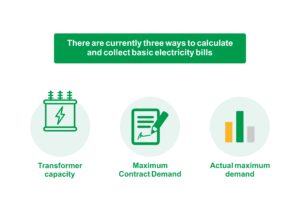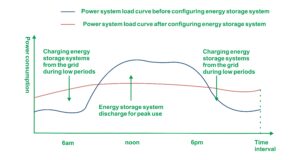How can industrial and commercial energy storage reduce demand/capacity electricity charges? This is a focus of many companies. Before answering this question, we first need to understand what demand/capacity electricity charges are.
The basic electricity price reflects the capacity cost in the enterprise cost, that is, the fixed cost part. The basic electricity fee can be calculated in one of three ways: transformer capacity, contract maximum demand, and actual maximum demand. The basic electricity fee paid by the user each month is only related to its capacity or maximum demand, and has nothing to do with its actual electricity consumption.
The electricity price refers to the electricity fee that users need to pay for their actual electricity consumption, usually calculated per kilowatt-hour (kWh). It is a major component of the electricity bill and is directly related to the user’s electricity consumption. The electricity price reflects the electricity cost in the enterprise’s electricity cost. When calculating the electricity price, the actual electricity consumption of the user is used as the billing basis.
The sum of the two electricity prices calculated separately is the total electricity bill that the user should pay.
So, how can industrial and commercial energy storage save costs for enterprises by reducing demand/capacity electricity charges?
When the fixed capacity of the transformer is used for calculation, the price is fixed. When the maximum demand of the transformer is used for calculation, the electricity price is related to the power of the system during a certain period of time. After the enterprise installs the energy storage system, the power of the energy storage machine can replace part of the transformer capacity to supply power to the load, which plays a role in smoothing the load power peak and reducing the overall capacity demand, thereby reducing the capacity electricity charge of the transformer.
Here are some of the main strategies:
First, energy storage systems can release stored energy during peak hours, thereby reducing demand on the grid and reducing demand charges. Since electricity prices are usually higher during peak hours, companies can not only reduce electricity costs but also ensure the stability of power supply by balancing the load with energy storage systems.
Second, energy storage systems can help companies optimize their electricity usage structure and reduce the demand for power capacity. By properly configuring energy storage equipment, companies can store electricity during low-price periods and use the stored energy during high-price periods, thereby reducing the overall demand for power capacity and reducing basic electricity costs.
In addition, energy storage systems can also provide companies with emergency backup functions to ensure the company’s power supply in emergencies. This can not only avoid production interruptions caused by power outages, but also avoid additional costs caused by insufficient demand or capacity.
Let’s take a simple example: suppose the demand electricity price for a certain voltage level in a certain area is 40 yuan/kilowatt·month. The power of the enterprise’s electricity consumption is 800kW in most periods, and only 1300kW in some periods.
Before installing the energy storage system:
The transformer demand electricity fee is 1300kW*40 yuan/kilowatt·month = 52,000 yuan per month.
After installing the 500kW/1045kWh energy storage system:
During the peak period, the transformer power is maintained within 800kW, then the transformer demand electricity fee is 800kW*40 yuan/kilowatt·month = 32,000 yuan/month, which can reduce the basic electricity fee by 20,000 yuan per month.
In addition to being a profit model of peak load shaving and valley filling, industrial and commercial energy storage systems can also effectively reduce demand/capacity electricity charges by balancing loads, optimizing power usage structure, and providing emergency backup functions, saving costs and improving efficiency for enterprises. With the continuous advancement of energy storage technology and the reduction of costs, it is believed that more and more companies will choose to use energy storage systems to reduce electricity expenses.








